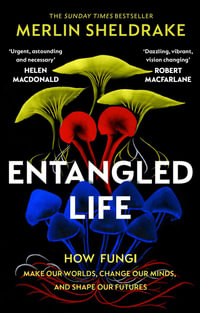
Culturing Life
How Cells Became Technologies
By: Hannah Landecker
Paperback | 16 October 2009 | Edition Number 1
At a Glance
Paperback
$70.80
Aims to ship in 15 to 25 business days
When will this arrive by?
Enter delivery postcode to estimate
How did cells make the journey, one we take so much for granted, from their origin in living bodies to something that can be grown and manipulated on artificial media in the laboratory, a substantial biomass living outside a human body, plant, or animal? This is the question at the heart of Hannah Landecker's book. She shows how cell culture changed the way we think about such central questions of the human condition as individuality, hybridity, and even immortality and asks what it means that we can remove cells from the spatial and temporal constraints of the body and "harness them to human intention."
Rather than focus on single discrete biotechnologies and their stories--embryonic stem cells, transgenic animals--Landecker documents and explores the wider genre of technique behind artificial forms of cellular life. She traces the lab culture common to all those stories, asking where it came from and what it means to our understanding of life, technology, and the increasingly blurry boundary between them. The technical culture of cells has transformed the meaning of the term "biological," as life becomes disembodied, distributed widely in space and time. Once we have a more specific grasp on how altering biology changes what it is to be biological, Landecker argues, we may be more prepared to answer the social questions that biotechnology is raising.
Industry Reviews
Landecker hits exactly the right balance of interpretive analysis and presentation of substance. Her stories carry the more technical descriptions so that both are motivated and compelling. I thoroughly enjoyed reading this book and, moreover, I found it exciting. -- Jane Maienschein, Regents' Professor and Parents Association Professor of Biology and Society
Culturing Life is a beautifully written, lucid account of the history of tissue culture, a technology that permits the isolation of cells from bodies, their continuous reproduction, and global distribution as immortalized cell lines. Landecker draws us into a world where the limits of biological plasticity are continually tested, cell fusion and cloning are commonplace, and biological time is transcended--in short, technological manipulation has forever transformed what it is to be biological. This book will rapidly become indispensable reading in the field of science and technology studies. -- Margaret Lock, author of Twice Dead: Organ Transplants and the Reinvention of Death
In our age of cloning and stem cells, Landecker's challenging study does a real service as it locates the techniques and ideas, developed through time, which make these cell manipulations possible. Landecker charts the uncertain movement of cells from organisms (including humans) to the laboratory, moving beyond cell cultures to the expectations of biologists and to the philosophical and ethical issues that emerge as control over life becomes possible. Others have written histories of cell theory; here Landecker recovers the story of the cell practices that have transformed what we mean by life. -- Everett Mendelsohn, Harvard University
A mere century ago, scientists didn't know how to culture cells in a medium and believed that cells couldn't live outside their parent organism. As Landecker reminds us, today we can hardly live without cell cultures, which are used for everything from routine medical tests to genetic engineering...She is a keen observer of scientific practice. * Publishers Weekly *
The discovery that it was possible to grow cells in a lab dish transformed them from being the immutable building blocks of individual bodies into plastic, malleable resources with a life of their own. In Culturing Life, anthropologist Hannah Landecker skillfully interweaves the scientific, historical, and cultural aspects of this transformation, and examines how cell culture challenges humanity's notions of individuality and immortality...An insightful and thought-provoking perspective on how technology has changed scientists' and society's understanding of life. -- Claire Ainsworth * New Scientist *
In the flood of instant comment on cloning and stem cells, we need the longer and deeper views of cellular technologies that only history can provide. Historians of science have written much about the nineteenth-century advent of cell theory, but genes and molecules stole the limelight in the twentieth...Culturing Life by Hannah Landecker is a small book that does much to fill that large gap...[An] original book...[A] stimulating reconstruction of the cultures that gave us cultured cells. -- Nick Hopwood * Nature *
Few laymen realize that scientists first fused cells from different species as far back as the 1960s, as Ms. Landecker describes...The level-headedness that can be gained from historical perspective is the value in reading Ms. Landecker's account. * The Economist *
Hannah Landecker's fascinating, beautifully written account of the history of cell culture restores the sense of wonder felt by the first scientists who grew living cells apart from organisms and by the people who read about their achievements in scientific journals, popular magazines, and newspapers. But this book does much more than that; it sheds a unique light on the history of biology in the 20th century, the rise of biotechnology, and our understanding of what life is...By reflecting on the catastrophic, artificial, and radically new variety of life that arises in the laboratory, Landecker opens new ways to articulate the ideas of the French philosopher of science Georges Canguilhem about the distinction between the normal and the pathologic. Cultured cells bring into question our understanding of the biologic, but their infinite plasticity, as Landecker eloquently shows, often unfolds in the normative space of medicine. -- Ilana Loewy * New England Journal of Medicine *
With her book Culturing Life, Hannah Landecker contributes an important chapter to the recent history of laboratory fractals. Her elegantly written and well-documented narrative demonstrates how, within 20th-century biological laboratories, a whole range of vessels and containers were used in order to store, breed, study, and manipulate cells and tissue outside the body of organic individuals: from hanging-drop preparations in the 1910s to tissue culture flasks in the 1930s and powerful freezers in the 1950s and 1960s....The great merit of this book is its demonstration that these spaces of knowledge also create and imply specific regimes of temporality. -- Henning Schmidgen * Project Muse Scholoary Journals Online *
Hannah Landecker provides a wonderful assortment of descriptions of experimental design, 'eureka'-type moments in the lab and the scientists responsible for initiating this new technology during the early 1900s, along with its evolution to the present...Well-written historical accounts of scientific discovery allow the reader to appreciate the adversities confronting the scientists involved and the circumstances that drove their discoveries and to wonder what may happen next. Culturing Life is no exception. -- Kendall L. Knight * Nature Publishing Group Book Review *
In this thoughtful, often elegant book, Hannah Landecker bridges the histories of science, medicine, and technology as she explores how cells were domesticated to the laboratory...She argues persuasively that appreciating the subtleties of cell culture history enables us to think more clearly and more deeply about current biotechnology. Culturing Life, then, is a fine example of "translational" historical research. -- Nathaniel Comfort * Project Muse Scholoary Journals Online *
Well-written historical accounts of scientific discovery allow the reader to appreciate the adversities confronting the scientists involved and the circumstances that drove their discoveries and to wonder what may happen next. Culturing Life is no exception. -- Kendall L. Knight * Nature Medicine *
ISBN: 9780674034761
ISBN-10: 0674034767
Published: 16th October 2009
Format: Paperback
Language: English
Number of Pages: 288
Audience: General Adult
Publisher: Harvard University Press
Country of Publication: US
Edition Number: 1
Dimensions (cm): 20.34 x 12.57 x 1.7
Weight (kg): 0.33
Shipping
| Standard Shipping | Express Shipping | |
|---|---|---|
| Metro postcodes: | $9.99 | $14.95 |
| Regional postcodes: | $9.99 | $14.95 |
| Rural postcodes: | $9.99 | $14.95 |
How to return your order
At Booktopia, we offer hassle-free returns in accordance with our returns policy. If you wish to return an item, please get in touch with Booktopia Customer Care.
Additional postage charges may be applicable.
Defective items
If there is a problem with any of the items received for your order then the Booktopia Customer Care team is ready to assist you.
For more info please visit our Help Centre.
You Can Find This Book In
This product is categorised by
- Non-FictionScienceScience in GeneralHistory of Science
- Non-FictionEngineering & TechnologyBiochemical EngineeringBiotechnology
- Non-FictionScienceBiology, Life SciencesCellular Biology
- Non-FictionMedicineMedicine in GeneralMedical Equipment & Techniques
- Non-FictionMedicinePre-Clinical Medicine & Basic Sciences
- Non-FictionScienceBiology, Life Sciences
























